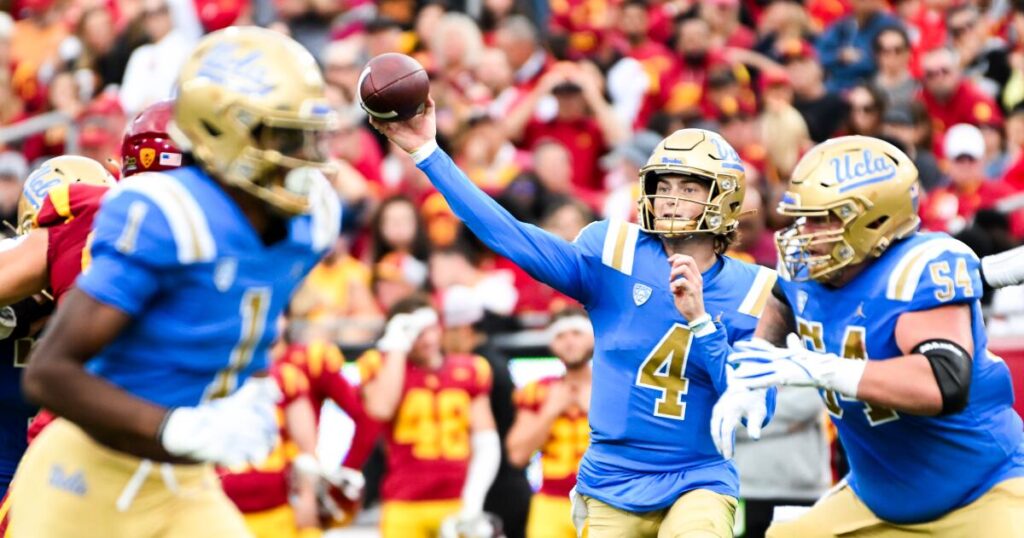Fifteen years ago, former Nebraska and Arizona State University quarterback Sam Keller filed a class action lawsuit that led to Electronic Arts Sports suspending the popular video game “College Football” in 2013. became. why? This game featured a player who, although he didn't have an actual name, resembled every player on every roster in almost every way.
EA settled with Keller and others for $40 million, with the NCAA contributing an additional $20 million. Although it sounds expensive, the payments to each player ranged from about $1,500 to $15,000.
Keller was publicly flogged on social media for “ruining the video game for us.”
“People saw this situation and thought I would pursue the matter. “They couldn't make it as an NFL player and needed to make some quick money,” Keller said in 2019, when college players had the right to be compensated for their name, image, and likeness, or NIL. told The Arizona Republic.
“I understand all that, but that was never the intention. This incident was about what's going on right now. [with NIL]. It was just the first of many steps to make the norm fair. ”
Currently, college players are earning large sums of money through NIL transactions. And did you know, Redwood City-based EA Sports has announced the return of the video game? “College Football 25” (the last version was his 2013 CF 14) will be released this summer.
And yes, the player's name will be used. Two weeks ago, EA offered $600 and a free copy of the game to players who agreed to have their likeness featured, and with more than 10,000 of the 11,390 FBS players already participating, EA is offering players $600 and a free copy of the game. up to $7 million for a total of $6 million. Some players may earn more than $600 by agreeing to promote the game.
Major awards will not be included from the start, as EA was unable to strike a deal with the National College Football Awards Assn. According to On3, many of the sport's individual awards are federated. Fans playing in “Road to Glory” or “Dynasty” modes will see players such as Chuck Bednarik (top defensive player), Fred Biletnikoff (top receiver), Davey O'Brien (top quarterback), and Doak. You will no longer be able to earn the real trophy that we award every year. Walker (top running back), Lou Groza (top placekicker), Jim Thorpe (top defensive back), Robert Maxwell (top player), John Outland (top interior lineman), Ray Guy (top Panther) won the award.
The Heisman Trophy is administered independently by the Heisman Trust, and it is unclear whether it will be awarded in-game. The same goes for the Bronko Nagurski Trophy (top defensive player) and the Dick Butkus Award (top linebacker).
According to the video game developer, gamers will no longer be able to manually add players who decide not to accept the offer. Among the players reportedly opting out is Texas quarterback Arch Manning, nephew of Peyton and Eli Manning. Quarterbacks Arch Manning and Quinn Ewers, who played behind last season, said on Instagram that they had accepted the offer. So did Oregon's Dillon Gabriel, Alabama's Jalen Milroe and Mississippi State's Jackson Dart.
Closer to home, they were joined by UCLA quarterback Ethan Garbers and USC wide receiver and explosive kick returner Zachariah Branch. So did most of his teammates.
“The response to the EA Sports College Football 25 athlete opt-in opportunity has been incredible,” EA Senior Vice President Darryl Holt said in a statement. “We look forward to welcoming more athletes in the coming weeks and debuting these first-class athletes in the game when it launches this summer.”
What else do we know about EA CF 25? All 85 FBS teams will compete in 2024 uniforms. The recent spate of conference reorganizations will be recognized. The new 12-team College Football Playoff features customization features. All bowl games will be featured.
Additionally, gamers' memorable Dynasty and Road to Glory modes from 2013 return with NIL components, and the game runs on the same engine as the Madden series.
Keller's lawsuit from 15 years ago illustrated EA's meticulous work and revealed at least one of the ways the video game company collects player information to make its games as realistic as possible.
“EA attempts to collate unique and highly identifiable play behaviors by sending detailed surveys to team equipment managers,” the complaint says. “Additionally, EA creates realistic virtual versions of real stadiums. They are populated with virtual athletes, coaches, cheerleaders, and fans realistically rendered by EA's graphic artists. The crunch of a player's pad. It incorporates realistic sounds such as sounds and crowd cheers.
“EA's games differ from reality. EA omits players' names on jerseys and assigns each player a different hometown than the actual player's hometown.”
The coaching staff was omitted this time, but Ole Miss coach Lane Kiffin told On3's Andy Staples that he would allow him to play in the game without pay.
“Kids like to play with it,” he said. “My brain thinks, “What would help me get hired?'' Even if you paid me for it, I wouldn't want it. I want it in our NIL.'' It is.”


